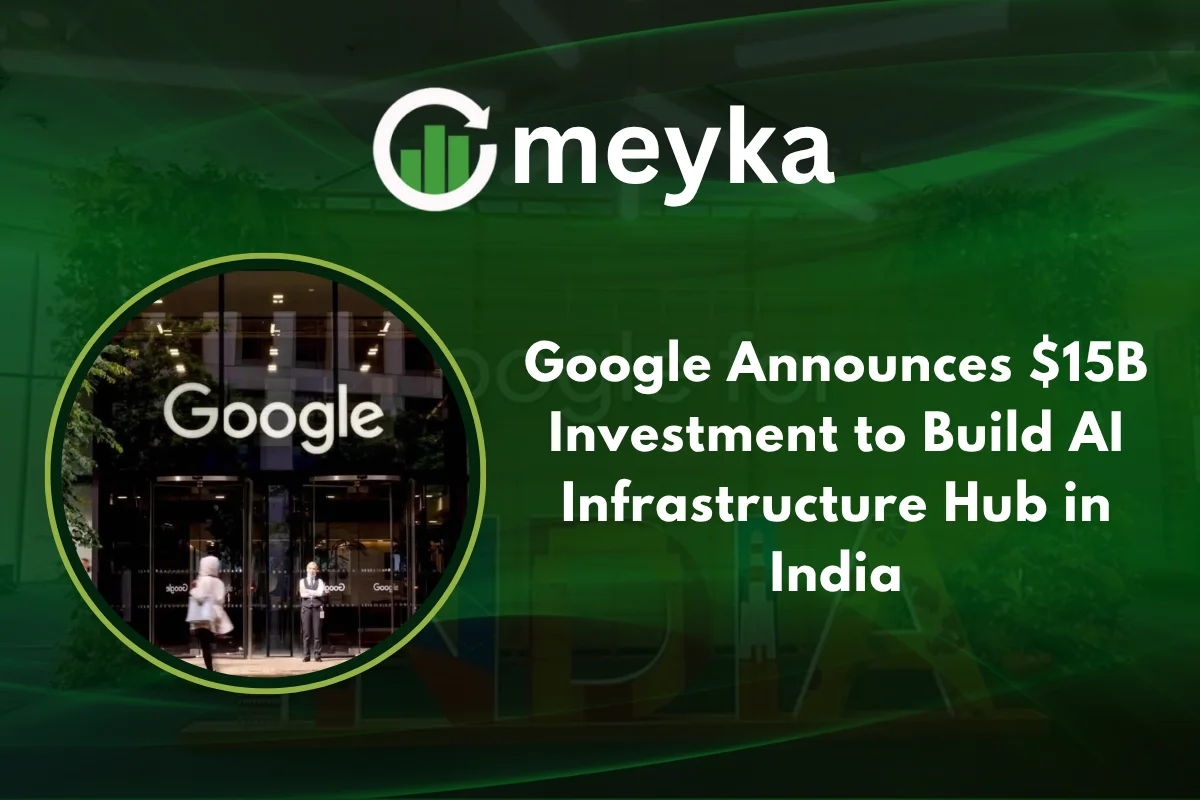Google Announces $15B Investment to Build AI Infrastructure Hub in India
Google has just unveiled a bold plan: a $15 billion investment to build a flagship AI infrastructure hub in India. This move signals not just its commitment to expansion, but also its vision to anchor India more firmly in the global artificial intelligence landscape.
Google’s Big Bet: $15B for an AI Hub in India
Google has announced that over the next five years, it will pour $15 billion into developing an AI data-centre and infrastructure campus in the Indian state of Andhra Pradesh. The site chosen is Visakhapatnam, on India’s east coast, where Google plans to build a gigawatt-scale data centre cluster, energy systems, fiber-optic networks, and even a new international subsea cable gateway.
This would be its largest AI hub outside the U.S. The hub is intended not only to serve Google’s internal needs but also to power services for Indian enterprises, startups, universities, and developers.
Google CEO Sundar Pichai said the investment will “bring our industry-leading technology to enterprises and users in India, accelerating AI innovation and driving growth across the country.”
The project has also received backing from the Indian government, and business partners such as Adani and Airtel are joining hands to build the infrastructure.
What This Investment Means for India and Beyond
1. Infrastructure Acceleration & Digital Sovereignty
India already feels the pressure of rising data demands. Its data centre capacity is expected to grow rapidly to meet digitalization and AI needs. Google’s investment accelerates that trajectory. Housing AI and data workloads locally also helps with data sovereignty (keeping data within national borders), which matters for privacy, regulation, and performance.
2. Stimulating Innovation & AI Ecosystem Growth
With a local AI hub, startups, academics, and enterprises in India will gain access to cutting-edge infrastructure. This lowers the entry barrier for building AI models, training large language models, or supporting compute-heavy applications. Over time, such infrastructure may help India become a global AI development center.
3. Jobs, Investment & Economic Multiplier
A project of this magnitude will generate jobs, from construction to operations to engineering to support roles. It also tends to draw in tangential investment: in clean energy, real estate, network infrastructure, and more. Google estimates this could catalyze billions of dollars in economic activity both in India and the U.S.
4. Competitive Pressure in the Cloud & AI Sector
Google’s move forces competitors like Microsoft Azure, Amazon Web Services, and regional cloud providers to up their game in India. To remain competitive in AI infrastructure, other tech giants may accelerate investments, possibly leading to a race in AI stocks and infrastructure plays.
Impact on Stock Market & AI-Focused Investing
Google/Alphabet (GOOGL)
For investors, this $15B commitment is a strong signal about Google’s long-term AI strategy. It underscores confidence in AI demand and may improve sentiment around stock research on Alphabet’s AI prospects. Some analysts may update forecasts to account for enhanced growth in Google Cloud and AI services. However, capital spending of this size also adds pressure on near-term margins.
Ripple Effects on AI Stocks & Infrastructure Plays
Other AI stocks, such as chip makers, cloud infrastructure firms, semiconductor designers, and data center REITs, could see positive spillover effects. As demand for computers, energy, and networking grows, these adjacent companies may benefit. Savvy stock research may identify which firms are best positioned to ride this wave.
Regional & Global Indirect Benefits
This announcement also raises India’s profile in the global tech investment landscape. Increased foreign capital, improved digital infrastructure, and better AI access may enhance India’s attractiveness for tech firms. Broader markets may view this favorably as a sign of long-term growth potential in the region.
Challenges & Risks to Watch
- Execution Complexity: Building gigawatt-scale data centres, clean energy systems, and subsea networks is highly complex and capital-intensive. Delays or cost overruns are possible.
- Regulation & Policy Issues: India’s regulatory environment on data, energy, and foreign investment must stay favorable.
- Competition & Saturation: Other tech giants will try to respond aggressively, possibly saturating the market or compressing margins.
- Demand Uncertainty: If demand for large AI computers slows or market cycles turn, infrastructure-heavy investments may face underutilization.
Outlook & Key Takeaways
Google’s announcement of a $15B AI infrastructure hub in India is a bold leap toward the future of AI deployment and global digital infrastructure. It positions India as a central node in the AI ecosystem, fuels competition in cloud and computer markets, and opens doors for adjacent infrastructure plays and AI stocks.
For the stock market, this underscores how strategic capital deployment can influence technology leadership and shape long-term earnings trajectories. Investors and analysts will likely intensify stock research around the computer, cloud, networking, and data center sectors.
The success of this project will depend on execution, partnerships, policy alignment, and sustained demand growth for high-end AI infrastructure.
FAQs
India offers a large and growing digital user base, abundant engineering talent, and increasing demand for cloud and AI services. Having local infrastructure helps with data sovereignty, lower latency, and cost efficiencies, making India a strategic location.
y building its largest AI hub outside the U.S., Google strengthens its infrastructure edge. This puts pressure on rivals to expand similarly, potentially igniting competition in the Indian cloud and AI markets and influencing AI stocks broadly.
Firms in data center infrastructure (cooling, power, networking), chip makers, semiconductor firms, power utilities (especially renewables), and cloud service providers could see demand growth. Good stock research may uncover winners among these segments.
Disclaimer:
This content is made for learning only. It is not meant to give financial advice. Always check the facts yourself. Financial decisions need detailed research.






